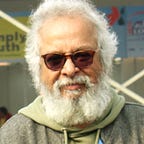BANGALORE DIARY-2
“Can you see the red-capped person at the corner of the street you’re in?”
I respond with a ‘Yes.’
“Good. Walk towards him.”
I do, and mobile phone communication is alive, so I am not lost.
“Now, take your left.”
I do.
“Can you see me?”
I don’t. It is dark.
“Okay. Now turn right. … Can you see me now?”
I can’t. But I see another person who waves at me.
That’s Selvan Dasaraj, my fellow traveler in the driver relations management domain.
After a few more steps, I see the direction-giver.
Sivasailam IAS, the first logistics secretary of the government of India, post-retirement, returned to his abode in HSR Layout, Bengaluru, to begin a new inning as a judge in the Karnataka Administrative Tribunal, where his tenure will end in mid-2025.
“You’re a superb navigator,” I tell him after shooking hands with him and entering his corner bungalow with Selvan, who reached the destination independently.
Mostly, I had interacted with him in Delhi and always found him suited and booted. Now, he is in a black pajama and a black collarless T-shirt.
He is the original architect of the much-talked-about National Logistics Policy (NLP). However, it was unveiled after he superannuated after an illustrious innings in his parent Karnataka cadre state and then in Delhi.
Now that I am in Bengaluru and traveling in Namma Metro, I keep reminding myself that this bureaucrat with Tirunelveli roots blue-penciled this mass rapid transport system.
He rarely issued orders during his tenure as the logistics secretary. He ‘navigated’ the terrain, selling NLP deftly.
“Issuing orders is the easiest route. I believe in a round table of stakeholders. Put the draft in the public domain, get their feedback, and then structure whatever was good for the nation,” he elaborates. Once again, his superb ‘navigational’ caliber was displayed then, like now.
He used his power to push when some stakeholders demurred. At the height of COVID-19, when a global giant acted tough, demanding physical documents to clear the consignment, he bluntly stopped the ship from entering the port. Accept electronic verification. Otherwise, keep your ship away from the shores. The cookie crumbled, and the logistics giant conceded defeat.
Over hot South Indian thattai (matti equivalent), halwa, and filter kapi, the discussion veers around collaborating with stakeholders to facilitate wayside amenities for long-haul truck drivers on highways and ports.
It’s a fallacy to think drivers don’t want to pay for secured and safe parking on the highways and destinations where they wait to unload; he points out. Fleet owners, he claims, are already paying drivers for using such facilities. But the drivers demur from putting that money for the right usage and prefer to pocket it.
His interest in logistics has not diminished a wee bit. Not to be forgotten is that he is the Chairman of the Chartered Institute of Logistics and Transport (CILT-India Chapter) and is fully engaged.
We discussed creating a truck parking facility at the Mangalore port. Of course, a payable service. He promises full support for this initiative.
The former bureaucrat is undoubtedly a navigator par excellence. With the super navigator, the road ahead, however challenging, would be traversed definitely. His passion for logistics is unmistakable.
